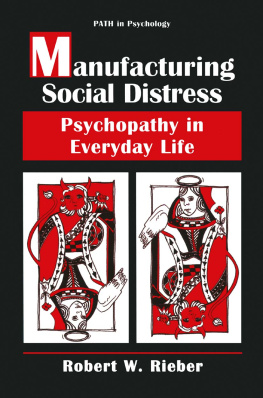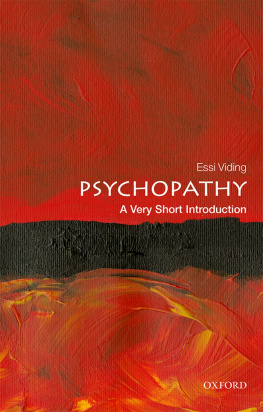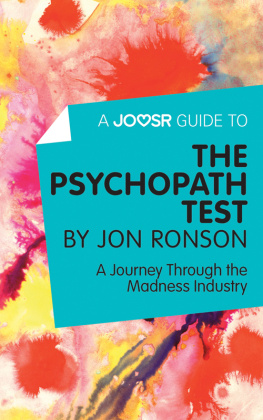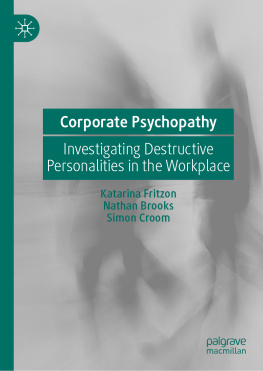There is not room on the page to give due recognition to everyone (and every experience) that birthed this book. Even determining a correct order leaves me stymied, so the following represents a wild gesture in the general direction of focusing my gratitude, with the caveat that it is incomplete and insufficient.
The omnipresence, skill, and guidance of Margaret Ryan, my editor extraordinaire, muse, and fairy god sister, has been insurmountable.
My Swiss friend, Robert Hinshaw, was the earliest inspiration and support who sparked the big dream of making this into a book.
I will remain forever grateful to all the people at Chiron Publications for believing in me and giving this project life.
The ever-present bedrock of love and ongoing encouragement from my husband, Wesley Maram, my children, Evan Fields and Nierika Gilbert, and my dog, Moki, has been invaluable.
Contents
Chapter 1
Psychopathy: Professional, Personal, and Collective Perspectives
Chapter 2
Questioning the Forensic Approach to Psychopathy
Chapter 3
Collective Psychopathy, the Media, Sex Offenders... and Jung
Chapter 4
The Story of Albert
Chapter 5
Psychopathy and Jungs Central Concepts
Chapter 6
Psychopathy as an Archetypal Concept
Chapter 7
Psychopathy as Lacunae: My Inner Psychopathy
Chapter 8
Guggenbhl-Craigs Symptoms of Psychopathy
Chapter 9
Psychopathy and Eros
Chapter 10
Psychopathy and Therapy
Chapter 11
Psychopathy and the Therapy Process: Diagnostic Issues
Chapter 12
A Clinical Perspective: The DSM-5 and Beyond
Chapter 13
Psychopathy in Mythology
Chapter 14
Concepts Related to Psychopathy
Chapter 15
The Opposites
Chapter 16
Noticing Inner and Outer Psychopathy
Chapter 17
My Father/My Self: Reflections on Final Reconciliation and the Magic of Eros
Chapter 18
Psychopathy as Infidelity to the Soul: Implications for Healing
Chapter 19
The Transformational Potential of Psychopathy
Authors Note
Case histories and stories presented in this text are true, but details have been altered to protect privacy. In some instances, similar cases have been consolidated into one example.
The Emptied Soul, On the Nature of the Psychopath,
Adolf Guggenbhl-Craig
Im now in this phase where Im looking back and things matter less than ever. The problem was, I never had a conscience. I was ego-driven and self-focused on my career. Ive finally decided theres no need to look further. I was solipsistic.
Albert Bodinger, August 26, 2009
Guggenbhl-Craig, Emptied Soul, ix.
T he concept of a gradated definition of psychopathy, which is the central theme of this book, emerged through a confluence of my personal and professional experiences. The spark that ignited that process was my experience of my fathers death, when I began to realize the connection between aspects of his personality and my work. Specifically, my job as a forensic psychologist working in the prisons and providing therapy for criminals represented my introduction to psychopathy from that perspective. With my fathers passing, my curiosity about psychopathy became personal, which gave birth to a broader inquiry and deeper understanding of this intriguing and complex trait.
In this book, I am focusing on the phenomenological, qualitative aspect of psychopathythe sense that something deep within is simply missing, as first conceptualized by Jungian analyst and author, Adolf Guggenbhl-Craig. This approach is distinctly different from a causal emphasis, as well represented by numerous theories, and instead invites exploring an archetypal dimension to the idea and our understanding of the character trait.
I struggled with using detailed personal information for what arguably constitutes case study purposes. My final decision to do so involved at least two reasons. The fact that something was missing in my fathers personality and in our relationshipAdolf Guggenbhl-Craigs psychopathic gaps, as it wereactually released me to be able to share details with candor that I would otherwise have been more guarded about. Although my father, Albert, and I somehow forged our own version of an intimate relationship, at least at the end of his life, I was forever unable to feel the safe connection with my father for which I yearned. As a result of his resolute abstinence from a traditional parental bond, I can analyze and discuss his personality with objectivity in a way I could not regarding my mother, for example, because with her I would feel protective. This reality is both painful and freeing, in terms of being able to examine and share details of my fathers historytoward the greater good. With all due respect to him and to the ancestors, submitting the story of Alberts character to scrutiny at this point, when he can no longer argue, feels somehow appropriateperhaps even compensatorywith the overriding goal of contributing positively to our understanding of psychopathy. I hope that the end will justify the means.
I hesitate to say this book is all about my father, but in some regard, it is. The bare truth of the world is that at some level, the personal is always at the core of our life experience, how we assemble and understand it. There is just such an expansive dimensionality in us all, spanning personal, professional, and collective.

T his book integrates several different approaches to the concept of psychopathy in response to several fairly distinct aspects of my own personal and professional life that began to appear related: forensic psychology concepts, my father and our relationship, Jungian concepts, clinical references, mythological material, and cultural observations. Interweaving these contents revealed the possibility of an expanded meaning and potential application of









